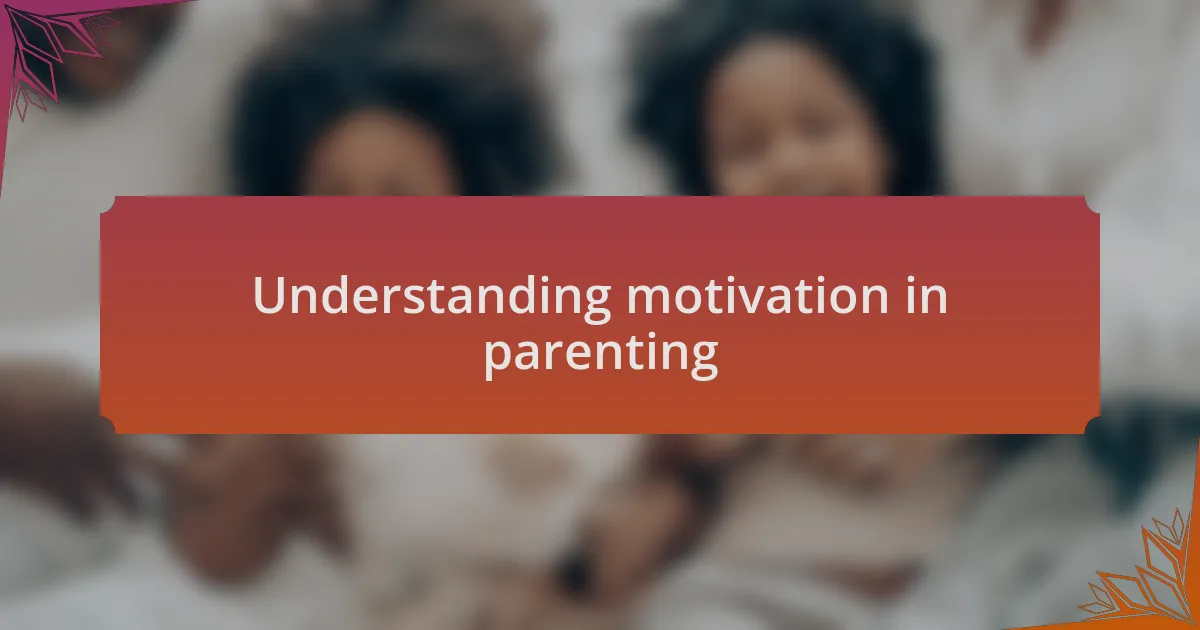Key takeaways:
- Motivation in parenting fluctuates and is fueled by the connection with children and witnessing their growth.
- Setting realistic, small goals and practicing gratitude can enhance motivation and create a positive parenting environment.
- Effective communication and fostering a sense of belonging are crucial for creating a supportive family atmosphere.
- Reflection on challenges and seeking support from others are key strategies for overcoming parenting obstacles.

Understanding motivation in parenting
Motivation in parenting often feels like a rollercoaster ride. Some days, I wake up feeling energized, ready to tackle the challenges of the day, while on others, I’m just trying to get through the morning chaos. It’s a constant reminder that our motivation ebbs and flows, influenced by the highs and lows of family life.
When my child proudly shares a new skill or offers a heartfelt hug, I realize that these small moments fuel my motivation. They remind me why I put in the effort day after day. I often find myself asking: What drives me to push through the tough days? The answer lies in the connection I have with my children and the joy that comes from seeing them thrive.
Understanding that motivation can be intrinsic is crucial. For instance, I often reflect on the values I want to instill in my children, and this thought inspires me to be a better parent. When I think about how my actions shape their future, I feel a renewed sense of purpose that compels me to keep going. Isn’t it fascinating how shifting our mindset can turn a challenging moment into a source of strength?

Importance of motivation for parents
Maintaining motivation as a parent is essential for creating a positive environment for our children. I remember one particularly challenging week when everything seemed to go wrong—homework battles, sleepless nights, and countless tantrums. Yet, it was the sense of responsibility I felt to model resilience that pushed me to rise above the chaos. In those moments, I often ask myself: How can I expect my children to develop coping skills if I don’t exhibit them myself?
Moreover, motivation plays a key role in fostering a supportive atmosphere for our families. I’ve learned that being motivated isn’t just about finding energy; it’s also about creating joy and connection in our daily routines. For instance, when I take a few moments each day to engage in fun activities or simply chat with my kids, I notice how their smiles and laughter recharge my motivation and the entire household’s spirit.
Ultimately, my motivation fuels my parenting journey, promoting not just my growth, but my children’s as well. Reflecting on my journey, I realize that every setback presents an opportunity for learning—both for me and for my kids. So, the question lingers: how can we embrace motivation as a tool for growth? When we see our challenges as lessons, we not only uplift ourselves but also demonstrate to our children the power of perseverance.

Techniques for staying motivated
One technique that has truly helped me stay motivated is setting small, achievable goals. I’ll often break larger tasks into manageable steps because it helps to celebrate even little victories. Recently, I decided to organize our family’s meal prep. Instead of overwhelming myself, I focused on planning one week at a time. Each time I tick off another meal, there’s this burst of satisfaction that fuels my motivation for the next week.
Another approach I find useful is surrounding myself with positivity. I tend to seek out uplifting resources—whether it’s a podcast, a book, or a supportive group of fellow parents. Engaging with these materials often sparks new ideas and keeps my mindset focused on growth. I remember joining a local parenting workshop; hearing other parents share their triumphs and struggles reminded me I’m not alone in this journey. Have you considered the power of community in your own motivation?
Finally, I practice gratitude daily, which has profoundly impacted my motivation. Each night, I jot down three things I’m grateful for that day, and I notice how this simple ritual shifts my perspective. It’s remarkable how focusing on the positive can inspire resilience during tough parenting moments, isn’t it? This technique not only uplifts my spirit but reminds me of the beauty in the everyday chaos of parenthood.

Setting realistic parenting goals
When it comes to setting realistic parenting goals, it’s essential to assess your family’s unique needs. I learned this firsthand while trying to establish a reading routine with my kids. By figuring out what times worked best for our evenings, I could commit to just 15 minutes a day, which felt attainable and enjoyable, rather than overwhelming. How often do we set expectations that end up causing stress instead of growth?
Breaking down goals into simpler components can be a game changer. For instance, when I wanted to encourage my children to help more around the house, I opted to assign just one small chore each week. At first, I thought it might not be enough, but I quickly realized that these small responsibilities instilled accountability without the dreaded resistance. Have you ever found that easing into a routine allows everyone to adapt better?
Lastly, I’ve discovered that flexibility is key. I once aimed to have a perfect family dinner every Sunday, but reality often had other plans. So, I shifted my goal to simply having dinner together on Sundays, leaving room for how that actually unfolds. This approach not only lessened the pressure but resulted in some of the most memorable dinners filled with laughter and shared stories. Isn’t it freeing to realize that perfection isn’t necessary for meaningful family moments?

Creating a supportive environment
Creating a supportive environment starts with effective communication. I remember a night when my child burst into tears over a minor mishap. Instead of dismissing it as trivial, I took the time to listen and understand their feelings. That moment taught me the power of validation; children thrive when they know their emotions matter. How often do we pause to truly hear our kids?
Another vital aspect is fostering a sense of belonging. When we designated a family game night, it wasn’t just about the games; it was about connection. I noticed how my children lit up, knowing they had a space to share their thoughts and jokes. Have you ever considered that these special rituals create lasting memories and strengthen family bonds?
Lastly, I emphasize the importance of encouragement in daily interactions. Celebrating small achievements, like mastering a new skill, can make a huge difference. I vividly remember my daughter beaming when I praised her for finishing a book independently. Those little victories build confidence and motivate them to keep trying. Isn’t it wonderful to see them blossom with just a bit of support?

Strategies for overcoming challenges
When it comes to overcoming challenges, I’ve found that breaking tasks into smaller, manageable pieces really makes a difference. For instance, during a particularly hectic week, I set a goal to declutter a messy room. Instead of tackling everything at once, I focused on just one corner each day. This approach not only made the task feel less daunting but also provided me with a sense of achievement after each small victory. Have you ever felt overwhelmed by a big project that seemed impossible to start?
Another strategy that I swear by is the power of reflection. After a challenging day, I like to take a moment to jot down what went well and what didn’t. This practice helps me identify patterns and triggers that can be adjusted for the next time. I still remember the frustration I felt when a routine fell apart because of unexpected interruptions. By reflecting on those moments, I’ve learned to adapt my expectations and strategies, ultimately leading to a more balanced approach. How often do we give ourselves the space to learn from our setbacks?
Lastly, I believe in the value of seeking support from others. During tough moments, reaching out to friends or family can provide not just comfort but also practical advice. I once called a close friend during a particularly challenging phase of parenting, and their insights offered me fresh perspectives and reassurance. Connecting with others reminds me that I’m not alone in this journey. Isn’t it reassuring to know that sharing our challenges can inspire solutions?

Personal reflections on motivation strategies
Finding motivation in daily parenting can be a journey of its own. One strategy that has worked wonders for me is creating a visual reminder of my goals. I once made a simple poster with quotes and pictures that resonate with my parenting aspirations. Every time I walk by it, I feel a renewed sense of purpose and energy. Have you ever experienced the impact of a simple visual cue in reshaping your mindset?
Another tactic I often use is celebrating small successes. It might sound trivial, but acknowledging even minor achievements can create a positive feedback loop. I remember a day when my child finally finished a challenging homework assignment. Instead of just moving on to the next task, we took a moment to celebrate that victory with a small treat. It transformed the atmosphere from routine to joyful, reminding both of us that effort deserves recognition. How often do we take the time to appreciate the little victories in our busy lives?
Lastly, I believe that maintaining a growth mindset is essential for motivation. This means viewing setbacks not as failures but as opportunities to learn. I had moments where my kids didn’t grasp a concept right away, and it felt discouraging. However, shifting my perspective to see those moments as stepping stones led to better experiences for both of us. The question is, how can we reframe our challenges to foster resilience in ourselves and in our children?